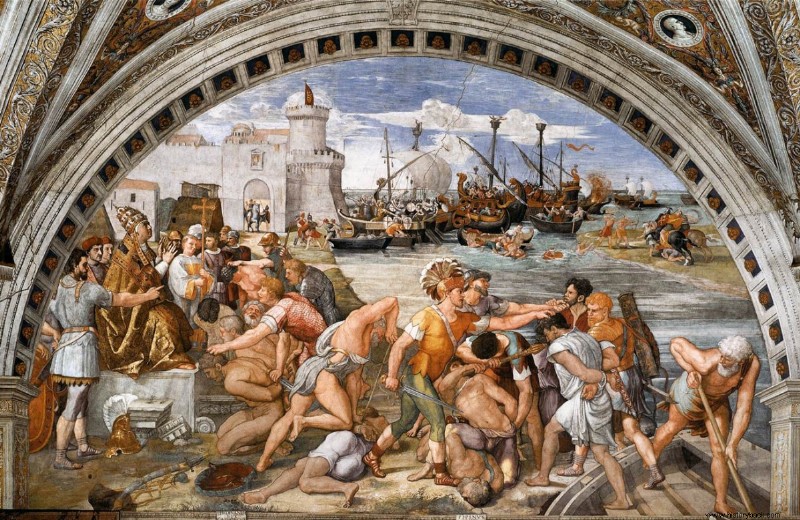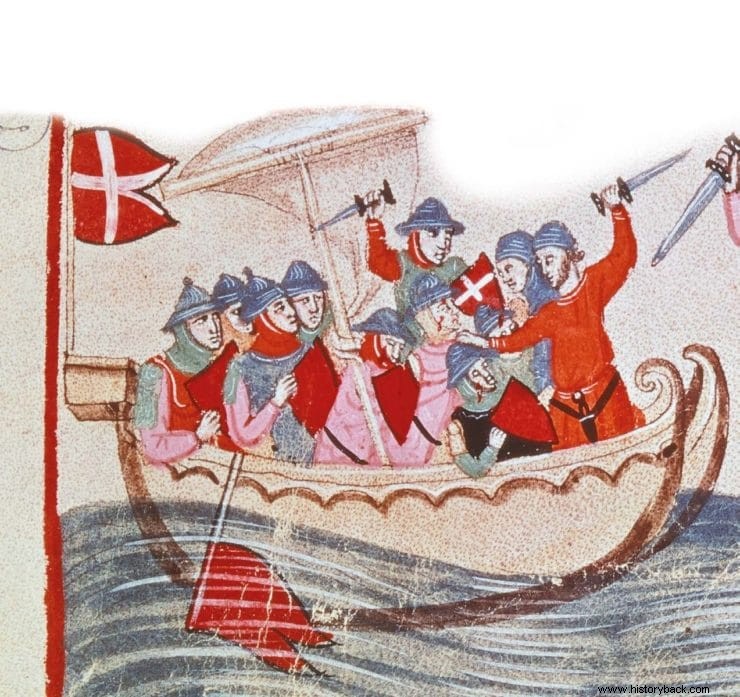Battle of Meloria of 1284
The Battle of Meloria it was a historic naval battle that involved the fleet of the Republic of Genoa . It sanctioned the definitive end of Pisa as a seafaring power in Italy during the Middle Ages .
After the great contrasts that occurred in previous centuries between the Republic of Genoa and the maritime republic of Pisa , the occasion for the final confrontation occurred in 1284 .
Part of the Genoese fleet was moored at Porto Torres , in Sardinia , then disputed territory between the two republics. The Pisans' plan was to strike in clear superiority - with 72 galleys - the Ligurian fleet, to then face the remainder and close the score with the Genoese forever.
Benedetto Zaccaria , future doge of Genoa , who commanded that part of the fleet composed of 20 galleys, evaded the clash, pretending a retreat towards the Ligurian Sea . The Pisan fleet pursued him, but was joined by the remaining part of the Genoese fleet (68 galleys) and retreated towards the Pisan port, not without launching a provocation to the Genoese city, in the form of a shower of silver arrows.
The fleet of the Republic of Genoa took up the challenge and on 6 August 1284 , day of San Sisto II patron saint of Pisa which from that day was no longer celebrated, sailed towards Porto Pisano , ancient port of Pisa , located south of the Arno mouth .
The Genoese admiral Oberto Doria led a first line of 63 war galleys made up of 8 Companions (ancient grouping of the districts of Genoa ): Castello, Macagnana, Piazzalunga and San Lorenzo, lined up on the left (plus some galleys under the command of Oberto Spinola), and Porta, Borgo, Porta Nuova and Soziglia positioned on the right.
Benedetto Zaccaria instead he commanded a team of thirty galleys, deliberately left on the sidelines to take the Pisan fleet by surprise. Part of it was moored in Porto Pisano , while another part stopped just outside the port.
It is said that, during the traditional blessing of ships, the silver cross of the Staff of the Archbishop of Pisa broke away. The Pisans did not care about this negative premonition:after all it was the day of their patron, the anniversary of so many glorious victories, and that was an excellent opportunity to definitively eliminate the Genoese:counting 63 Genoese woods, the Pisans strong with 9 more ships they decided to leave the port.
According to the customs of the Potestal Government , the Pisans had chosen a foreigner as Podestà, Morosini from Venice . The Venetians as is well known, they have always been in rivalry against Genoa , but at this juncture they had refused support for the Tuscan republic. Morosini attended :the Count Ugolino della Gherardesca and Andreotto Saraceno .
The Pisans, after a first hesitation, decided to attack the Genoese fleet and launched themselves on the front line. Both fleets were in stride, or half-arch, formation. The clash was therefore head-on. The famous Genoese crossbowmen, sheltered behind their paves, fired against the Pisan woods, while these tried, according to the tactics of the time, to ram the ships with the rostrum and then board them. If the boarding did not take place, the crews hit each other with all sorts of ammunition thrown by war machines or by their bare hands, such as stones, boiling pitch and even powdered lime.

The fate of the battle was decided after hours by the thirty Woods of Zacharias , which fell on the Pisan side, caught completely unprepared by the maneuver, and by the very existence of those galleys:it was a ruin of wood, bodies and blood. Of the entire Pisan fleet, only twenty galleys, those commanded by Count Ugolino , they were saved. The accusation of cowardice, if not of treason, will not prevent the count from conquering the de facto lordship and from remaining at the top of the city government until his deposition 1288 and the famous death by starvation 1289 .
Some historians report that the Genoese reinforcement contingent was hidden behind the islet of Meloria (then a low rock above sea level), but this is probably a misunderstanding as a naval team, even a small one, could not possibly have avoided being seen. One hypothesis is that the ships were actually hidden at the bottom of an island in the archipelago.
Another reason for the Pisan defeat must be identified in the now obsolete naval and individual armament. The Pisan ships, older and heavier, also embarked troops with full armor despite the August heat, and during the very long battle the Genoese, equipped with reduced and lighter armor, clearly benefited.

Between five and six thousand were the dead, and almost eleven thousand were the prisoners including the Podestà Morosini , which was brought with the others to Genoa in the so called Campo Pisano district (hence the saying:“Who wants to see Pisa , go to Genoa "). Among the prisoners also the illustrious Rustichello who helped Marco Polo to write his Million in Genoese prisons. Only a thousand Pisan prisoners returned home after thirteen years of imprisonment. The others all died and are buried under the Genoese quarter that sadly still bears their name.
Pisa signed the peace with Genoa in 1288 , but he did not respect it. This forced Genoa to one last show of force.
In 1290 Corrado Doria he set sail with some galleys to Porto Pisano , finding its access barred by a large chain. It was the blacksmith Noceto Ciarli to have the idea of lighting a fire under it to make it incandescent in order to break it with the weight of the ships. The port was razed to the ground and salt was spread over its ruins, as happened in Carthage at the time of Scipio . With this gesture the power of Pisa on the sea it was finally extinguished and after ten years the city was finally subdued by Florence .
In the XXXIII canto of the Inferno Dante Alighieri he was merciless with the city of Pisa , to the point of hoping that the Arno would flood it and all citizens would drown. But, a few lines later, he was the same with Genoa and above all with the Genoese, going so far as to hope that they would be "scattered throughout the world". In his own way the author of the Divine Comedy it was therefore equidistant with regard to the conflict that had opposed Genoa and Pisa in the thirteenth century , a century in which, almost entirely, the stakes between the two seaside cities had been hegemony in the waters of the Tyrrhenian . Previously, actually, Genoa and Pisa had supported each other in defending against Saracen assaults which had known its peak with the devastation of the Genoese port (934-935) when - as reported by Liutprando di Cremona - the North Africans fell on the city several times, killing almost all the men after having ransacked the churches.
Pisa was then attacked by the "Moor" raiders, but in a less violent way, in 1005 and in 1011 . Towards the end of the 11th century, Arab privateers became less aggressive and the era of short peace and long competition began between the two cities.
